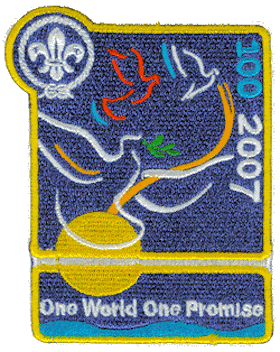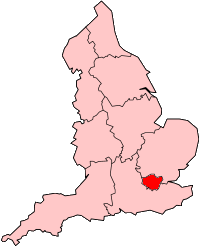
Scouting, also known as the Scout Movement, is a worldwide youth social movement employing the Scout method, a program of informal education with an emphasis on practical outdoor activities, including camping, woodcraft, aquatics, hiking, backpacking, and sports. Another widely recognized movement characteristic is the Scout uniform, by intent hiding all differences of social standing in a country and encouraging equality, with neckerchief and campaign hat or comparable headwear. Distinctive uniform insignia include the fleur-de-lis and the trefoil, as well as merit badges and other patches.

Brownsea Island is the largest of the islands in Poole Harbour in the county of Dorset, England. The island is owned by the National Trust with the northern half managed by the Dorset Wildlife Trust. Much of the island is open to the public and includes areas of woodland and heath with a wide variety of wildlife, together with cliff top views across Poole Harbour and the Isle of Purbeck.

The Baden-Powell Scouts' Association (B-PSA) is a worldwide youth organisation originating in the United Kingdom, with friendly relationships with similar traditional scouting organisations in various countries. Baden-Powell Scouting focuses on the importance of tradition in the scout movement.

In Scouting, a jamboree is a large gathering of Scouts and/or Girl Guides who rally at a national or international level.

Scouting in Tasmania began in 1908 with several separate associations operating in the early years including the Chums Scout Patrols, League of Boy Scouts, Girl Peace Scouts, British Boy Scouts and YMCA Scouts. These were later joined by The Boy Scouts Association, The Girl Guides Association and Life-Saving Scouts and Life Saving Guards of the Salvation Army. Some local groups of Scouts moved between associations. There has also been representation by the Baden-Powell Scouts' Association with a group of scouts in Devonport under Alan Richmond, OAM affiliating in May 1984.

The 21st World Scout Jamboree was held in July and August 2007, and formed a part of the Scouting 2007 Centenary celebrations of the world Scout Movement. The event was hosted by the United Kingdom, as 2007 marked the 100th anniversary of the founding of Scouting on Brownsea Island.

The Scouting 2007 Centenary comprised celebrations around the world in which Scouts celebrated 100 years of the world Scout movement. The original celebrations were focused on the United Kingdom, such as the camp on Brownsea Island, the birthplace of Scouting, and the 21st World Scout Jamboree in Chelmsford, Essex.

The Brownsea Island Scout camp was the site of a boys' camping event on Brownsea Island in Poole Harbour, southern England, organised by Lieutenant-General Baden-Powell to test his ideas for the book Scouting for Boys. Boys from different social backgrounds participated from 1 to 8 August 1907 in activities around camping, observation, woodcraft, chivalry, lifesaving and patriotism. The event is regarded as the origin of the worldwide Scout movement.

The Skolta Esperanto Ligo (SEL) brings together Esperanto-speaking Scouts from all over the world.

The 3rd World Scout Jamboree was held in 1929 at Arrowe Park in Upton, near Birkenhead, Wirral, United Kingdom. As it was commemorating the 21st birthday of Scouting for Boys and the Scouting movement, it is also known as the Coming of Age Jamboree. With about 30,000 Scouts and over 300,000 visitors attending, this jamboree was the largest jamboree so far.

Humshaugh is a parish near Hexham in Northumberland, England. The village had a population of 622 in the 2011 census, and is just north of Chollerford, which is located near Chesters Fort (Cilurnum) on Hadrian's Wall and is about 21 miles west of Newcastle upon Tyne. The village of Humshaugh lies just off the military road running from Newcastle to Carlisle which was built by General Wade during the 1745 Jacobite rebellion. Other nearby villages include Low Brunton and Walwick. Humshaugh is usually pronounced Humz-hoff, although some genuine locals have been heard calling it Humz-haff.

The 9th World Scout Jamboree, also known as the Jubilee Jamboree, was held at Sutton Park, Royal Town of Sutton Coldfield, Warwickshire, England, for twelve days during August, 1957. The Jamboree marked dual milestones as it was both the 50th anniversary of the Scouting movement since its inception at Brownsea Island and the 100th anniversary of the birth of Scouting's founder Robert Baden-Powell.

Scouting in the region of Greater London is largely represented by The Scout Association of the United Kingdom and some Groups of traditional Scouting including the Baden-Powell Scouts' Association.

Scouting in North East England refers to Scouting in the official region of North East England. It is largely represented by the Scout Association of the United Kingdom and some groups of traditional Scouting, including the Baden-Powell Scouts' Association.

Scouting for Boys: A handbook for instruction in good citizenship is a book on Boy Scout training, published in various editions since 1908. Early editions were written and illustrated by Robert Baden-Powell with later editions being extensively rewritten by others. The book was originally a manual for self-instruction in observation, tracking and woodcraft skills as well as self-discipline and self-improvement, about the British Empire and duty as citizens with an eclectic mix of anecdotes and unabashed personal observations and recollections. It is pervaded by a degree of moral proselytizing and references to the author's own exploits. It is based on his boyhood experiences, his experience with the Mafeking Cadet Corps during the Second Boer War at the siege of Mafeking, and on his experimental camp on Brownsea Island, England.
The 17th World Scout Jamboree was held August 8 to 16, 1991 and was hosted by South Korea at Seoraksan National Park,200km fro. border with North Korea, and another 200km from Seoul.

Jamboree 2008 was developed as "an Inter-organisational & International event" which was intended to "bring 600 young people from Scouting and Guiding together — to develop skills & friendships that will lay the foundations for the next 100 years of Scouting". The Jamboree was set up to be independent of Associations, and hoped to involve members of the World Federation of Independent Scouts (WFIS), the World Organization of the Scout Movement (WOSM), and the World Association of Girl Guides and Girl Scouts (WAGGGS).

The Crystal Palace Rally was a gathering of Boy Scouts and Girl Scouts at the Crystal Palace in London on Saturday, 4 September 1909. The rally demonstrated the rapid popularisation of Scouting with an estimated 11,000 boys attending with the prominent presence of Girl Scouts also being significant for the start of Girl Scouts and Girl Guides. The rally was held a year and a half after the publication of Scouting for Boys and The Scout magazine, and two years after Robert Baden-Powell's demonstration Brownsea Island Scout Camp.

B-P's footprint is a casting, usually in bronze or brass, of the right foot of Lord Baden-Powell, the founder of the Scout and Guide Movements, who is known as "B-P." The idea is that people may put their foot into this casting, so that they can say that they have "walked in the footsteps of B-P."


















